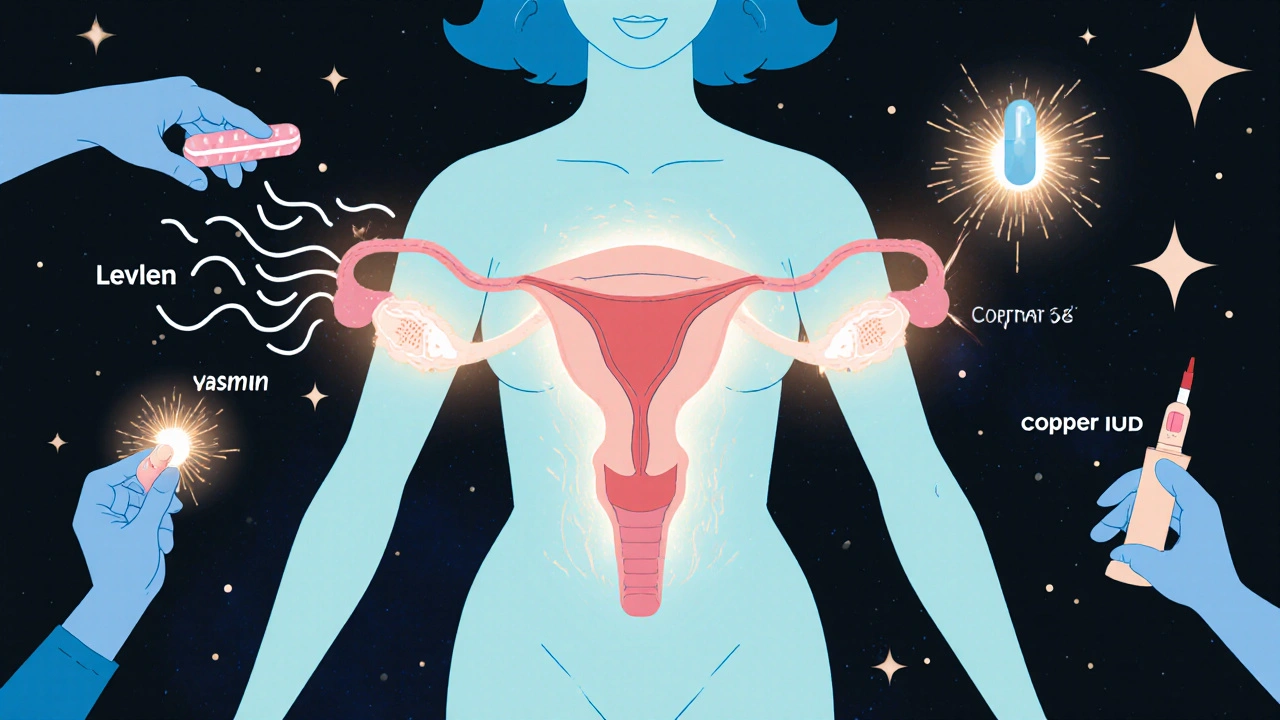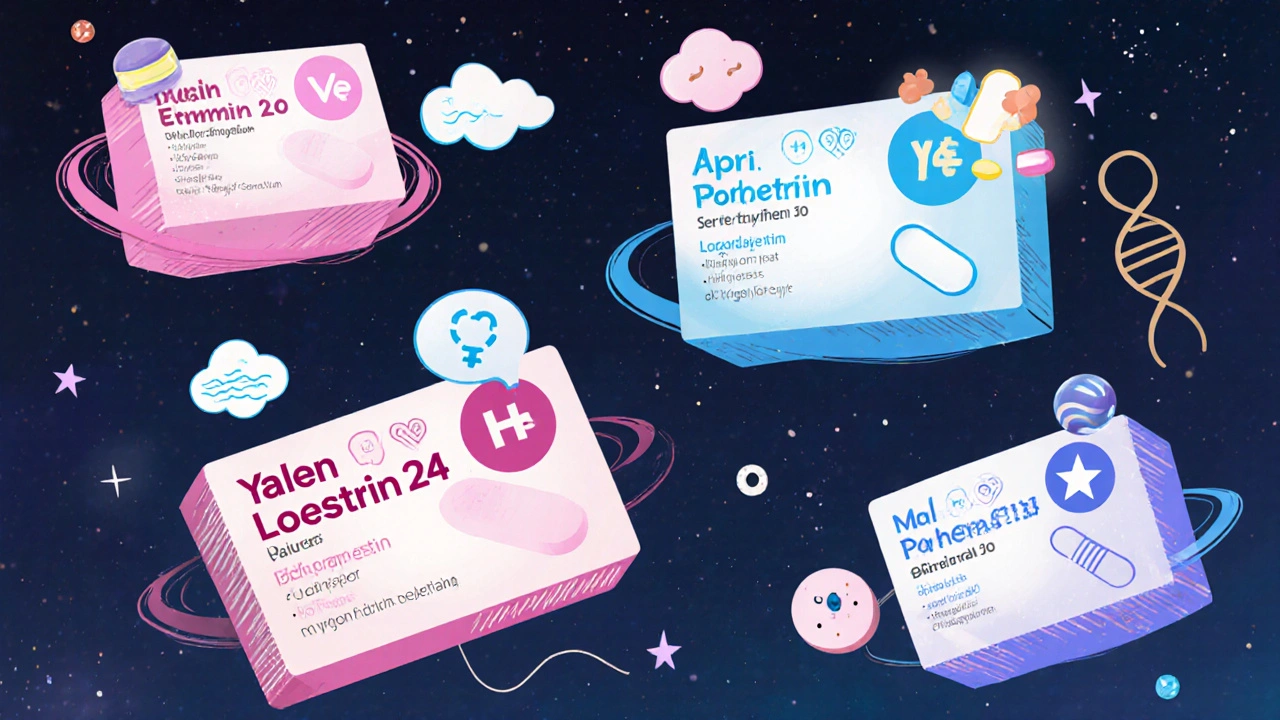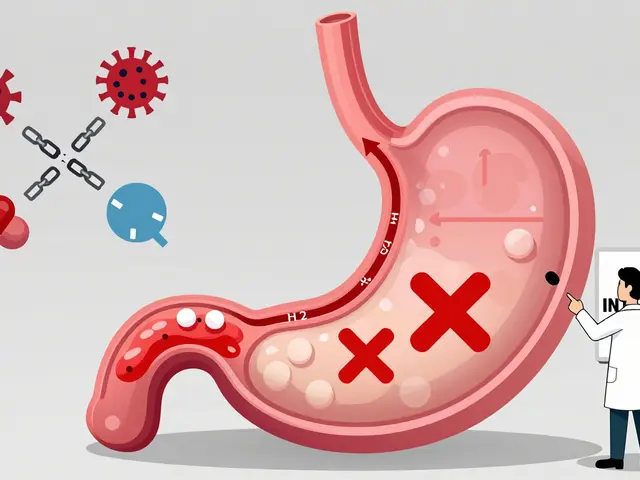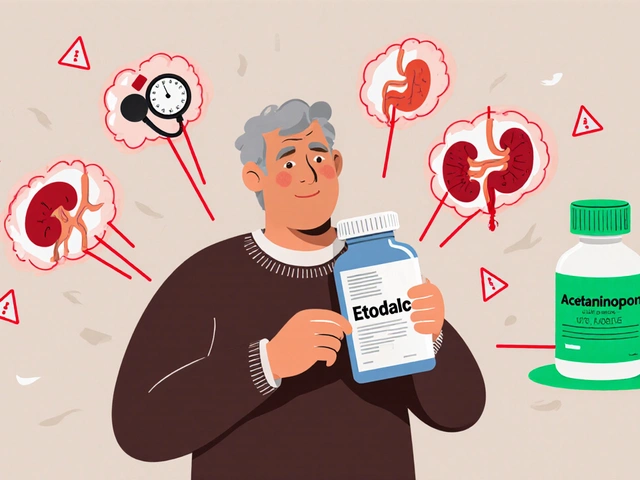Birth Control Pill Comparison Tool
Find the best birth control pill for you
Compare Levlen with other birth control pills based on your specific needs and concerns. This tool helps you understand key differences in hormones, side effects, and costs.
Levlen is a combined oral contraceptive pill that’s been used for decades to prevent pregnancy. It contains two hormones: levonorgestrel and ethinyl estradiol. But if you’re considering Levlen, you’re probably wondering: are there better or different options out there? Maybe you’re dealing with side effects, cost issues, or just want to know what else is available. This isn’t about picking the "best" pill-it’s about finding the one that fits your body, lifestyle, and needs.
What’s in Levlen?
Levlen delivers 0.15 mg of levonorgestrel and 0.03 mg of ethinyl estradiol per active tablet. That’s a low-dose combination, meaning it’s designed to minimize hormone exposure while still being effective. Most people take it in a 21-day active pill cycle, followed by 7 days of placebo pills-or sometimes a 28-day pack with iron supplements in the last week. The hormones stop ovulation, thicken cervical mucus, and thin the uterine lining-all to prevent pregnancy.
Levlen works well for many. But not everyone tolerates it. Some report mood swings, headaches, or spotting. Others find the hormone levels too high or too low for their system. That’s why alternatives exist-and why comparing them matters.
Common Alternatives to Levlen
There are dozens of combined oral contraceptives on the market. Here are the most common ones you’ll hear about from doctors or see in pharmacies:
- Yasmin - Contains drospirenone and ethinyl estradiol. Drospirenone is a different type of progestin that may help with acne and bloating, but it carries a slightly higher risk of blood clots than levonorgestrel.
- Loestrin 24 Fe - Uses norethindrone acetate and ethinyl estradiol, with 24 active pills instead of 21. This reduces the placebo week, which can mean fewer breakthrough bleeds and shorter periods.
- Apri - Similar hormone levels to Levlen (0.15 mg levonorgestrel, 0.03 mg ethinyl estradiol), but made by a different manufacturer. It’s often cheaper and just as effective.
- Microgynon 30 - A European standard with the same hormone combo as Levlen. Widely used globally and often prescribed as a first-line option.
- Triphasil - A triphasic pill that changes hormone levels over three phases of the cycle. Some users report fewer side effects because the dose shifts gradually.
These aren’t random picks. Each has been studied in clinical trials and approved by health regulators like the TGA (Therapeutic Goods Administration) in Australia. But their differences matter.
Key Differences: Hormones, Doses, and Side Effects
Not all pills are created equal. The main variations come from the type of progestin, the estrogen dose, and the pill schedule.
| Pill Name | Progestin | Estrogen (mcg) | Active Days | Common Side Effects |
|---|---|---|---|---|
| Levlen | Levonorgestrel | 30 | 21 | Mood changes, breast tenderness, spotting |
| Yasmin | Drospirenone | 30 | 21 | Lower bloating, higher clot risk, potential potassium changes |
| Loestrin 24 Fe | Norethindrone acetate | 20 | 24 | Lighter periods, fewer withdrawal bleeds |
| Apri | Levonorgestrel | 30 | 21 | Same as Levlen, often lower cost |
| Microgynon 30 | Levonorgestrel | 30 | 21 | Same as Levlen, widely studied |
| Triphasil | Norethindrone | 35 → 50 → 35 | 21 | Less breakthrough bleeding, more complex schedule |
Notice that Apri and Microgynon 30 have the exact same hormone levels as Levlen. So if you’re just looking for a cheaper version, those are direct substitutes. But if you’re struggling with bloating or acne, Yasmin might be worth a try. If your periods are heavy or irregular, Loestrin 24 Fe’s longer active phase could help.
When to Stick With Levlen
Levlen isn’t outdated. It’s been around since the 1980s and still works reliably for millions. If you’re on it and feel fine-no mood crashes, no weight gain, no spotting-you should stay on it. There’s no need to fix what isn’t broken.
Also, Levlen is often covered under the PBS (Pharmaceutical Benefits Scheme) in Australia. That means you pay less than $30 per script with a concession card, or under $30 without one. Some alternatives aren’t subsidized, making them significantly more expensive.
If you’re on a budget and doing well on Levlen, switching for the sake of switching doesn’t make sense. Stick with what works.

When to Consider Switching
Here are clear signs it might be time to explore alternatives:
- You’ve had persistent nausea or headaches for more than three months.
- You’re experiencing breakthrough bleeding every cycle.
- You’ve gained weight you can’t explain, even with diet and exercise.
- You’re dealing with depression or anxiety that started after starting the pill.
- You’re trying to manage acne or premenstrual symptoms, and Levlen isn’t helping.
These aren’t deal-breakers-they’re signals. Your body might respond better to a different progestin or a lower estrogen dose. For example, switching from 30 mcg ethinyl estradiol to 20 mcg (like in Loestrin 24 Fe) can reduce side effects without lowering effectiveness.
Some women find that switching to a pill with drospirenone (like Yasmin) helps with acne or PMS. Others prefer norethindrone because it’s less likely to cause mood changes. It’s trial and error-but you don’t have to guess blindly.
Non-Pill Alternatives
Levlen is just one option. If you’re open to other methods, there are more effective and longer-lasting choices:
- Implants (Nexplanon) - A small rod placed under the skin of your arm. Releases etonogestrel for up to three years. Over 99% effective. No daily pills. Side effects include irregular bleeding.
- IUDs (Mirena, Kyleena) - Hormonal IUDs release levonorgestrel directly into the uterus. They last 5-8 years, reduce periods, and have fewer systemic side effects than pills.
- Depo-Provera shot - A progestin-only injection every 12 weeks. Great if you forget pills, but can cause bone density loss with long-term use.
- Non-hormonal IUD (Paragard) - Copper-based, lasts 10 years. No hormones. Can make periods heavier, but ideal for those avoiding hormones entirely.
These aren’t "better" than Levlen-they’re different. If you want zero daily effort, an IUD or implant is far more reliable. If you want to avoid hormones, copper IUDs are the only non-hormonal option with long-term protection.
What Doctors Look For When Recommending Alternatives
Doctors don’t just pick pills at random. They consider your health history:
- Do you have a history of blood clots? Then avoid pills with drospirenone or high estrogen.
- Do you smoke and are over 35? Combined pills are usually not recommended.
- Are you breastfeeding? Progestin-only pills or IUDs are safer.
- Do you have migraines with aura? Estrogen-containing pills can increase stroke risk.
- Are you managing PCOS or endometriosis? Some pills help with symptoms more than others.
That’s why a one-size-fits-all approach doesn’t work. What’s right for your friend might not be right for you. Your doctor will check your blood pressure, review your family history, and ask about your lifestyle before suggesting a switch.

Cost and Accessibility in Australia
Levlen is listed on the PBS, so you pay around $30.80 (or less with a concession card). But not all alternatives are subsidized.
- Yasmin - Not on PBS. Costs $80-$100 per pack without subsidy.
- Loestrin 24 Fe - On PBS. Similar cost to Levlen.
- Apri - On PBS. Often cheaper than brand-name Levlen.
- Implants and IUDs - Higher upfront cost ($200-$400), but last years. Often covered by private insurance or public health programs.
If cost is a barrier, Apri or Microgynon 30 are direct, cheaper alternatives to Levlen. If you want better acne control and can afford it, Yasmin might be worth the extra cost.
How to Decide What’s Right for You
Here’s a simple way to think about it:
- Are you happy with Levlen? No side effects? Good cycle control? Stick with it.
- Are you having side effects? Write them down. Are they mild or disruptive?
- What’s your goal? Fewer periods? Better skin? Less cost? Less hassle?
- What’s your budget? Can you afford a non-PBS pill? Or do you need PBS coverage?
- Are you open to non-pill options? If you forget pills often, an IUD or implant might be easier.
There’s no rush. Talk to your doctor. Ask for a trial of a different pill for 2-3 months. Track your symptoms. You might find a better fit.
Final Thoughts
Levlen is a solid, reliable option. But it’s not the only one-and it’s not the right one for everyone. The key is matching your body’s response with your lifestyle. If you’re struggling, switching isn’t failure. It’s smart self-care.
Many women find their ideal contraceptive after trying two or three options. Don’t settle for discomfort just because Levlen worked for someone else. Your hormones, your rules.
Is Levlen the same as Microgynon 30?
Yes, Levlen and Microgynon 30 contain the same active ingredients: 0.15 mg levonorgestrel and 0.03 mg ethinyl estradiol. They’re bioequivalent, meaning they work the same way in your body. The difference is the manufacturer and sometimes the packaging. Microgynon 30 is often cheaper and widely available in Australia under the PBS.
Can I switch from Levlen to Yasmin for acne?
Yes. Yasmin contains drospirenone, a progestin that has anti-androgenic properties, which can help reduce acne and oiliness. Many dermatologists recommend it for acne-prone patients on birth control. However, it’s not subsidized by PBS, so it costs more. Talk to your doctor about whether the benefits outweigh the cost for your situation.
Do all birth control pills cause weight gain?
No. Studies show that most women don’t gain significant weight from combined pills. Any initial bloating or water retention usually fades after a few months. If you notice persistent weight gain, it could be due to other factors like diet, stress, or thyroid function-not necessarily the pill. Switching to a lower-dose pill or a progestin-only option might help if you suspect the hormones are contributing.
What’s the safest birth control pill for someone with a family history of blood clots?
If you have a family history of blood clots, combined pills (especially those with drospirenone or high estrogen) are usually avoided. Progestin-only pills, implants, or copper IUDs are safer options. Your doctor may recommend a progestin-only pill like Cerazette or an IUD like Kyleena. Genetic testing for clotting disorders may also be advised before starting any hormonal method.
Can I skip the placebo week on Levlen?
Yes. Skipping the placebo week and starting a new pack right away is safe and commonly done to avoid withdrawal bleeding. This is called continuous or extended use. Many women do this to reduce period-related symptoms or for convenience. You might get breakthrough spotting at first, but it usually settles down. Talk to your doctor before making the change.






Matthew Kwiecinski
31 October, 2025 . 23:59 PM
Levlen and Microgynon 30 are bioequivalent. The only difference is branding and cost. If you're paying more than $30 for Levlen in Australia, you're being scammed. Apri is the same thing and often cheaper. Stop overthinking it.
Justin Vaughan
1 November, 2025 . 12:42 PM
Seriously though, if you're on Levlen and it works? Don't touch it. I switched to Yasmin for acne and ended up with mood swings so bad I cried during a Zoom call. The pill isn't the enemy-your body's chemistry is. Give it time, track symptoms, and don't chase trends. Your future self will thank you.
Manuel Gonzalez
1 November, 2025 . 23:11 PM
Thanks for laying this out so clearly. I’ve been on Levlen for five years and never questioned it until my friend started raving about Loestrin 24 Fe. Turns out my periods were lighter and my skin improved just by switching to Apri. Same hormones, half the price. Sometimes the best solution is the simplest one.
Brittney Lopez
2 November, 2025 . 14:11 PM
For anyone feeling overwhelmed-this is normal. I tried four different pills before finding my fit. The key isn't finding the 'perfect' one-it's finding the one that lets you live without constant side effects. Talk to your doctor. Keep notes. You’ve got this.
Jens Petersen
4 November, 2025 . 05:56 AM
Let’s be real-Levlen is the pharmaceutical industry’s way of selling you a 1980s relic while charging you premium prices. Meanwhile, Yasmin? That’s a $100 monthly tax on your hormones for the privilege of pretending acne is a medical condition. And don’t get me started on the IUD marketing machine. Big Pharma doesn’t care if you bleed or feel like a zombie-they care if you keep buying.
Keerthi Kumar
6 November, 2025 . 01:35 AM
As someone from India, where Levlen is rarely available, I’ve tried Microgynon 30, Loestrin, and even a local brand-Saheli. The truth? Hormonal pills are not one-size-fits-all, and cultural access matters. In rural areas, women rely on Depo-Provera because pharmacies are miles away. But here’s the real issue: we’re taught to fix our bodies, not the system that makes birth control so expensive and confusing. Maybe the answer isn’t another pill-but better education, access, and trust in our own bodies.
Dade Hughston
7 November, 2025 . 08:32 AM
ok so i switched to yasmin cause my acne was killing me and now im having panic attacks every time i see my reflection and my boyfriend says im weird but i think its the pill and also i think the doctor is lying to me about the clot risk because i read on a forum that drospirenone is basically poison and now i cant sleep and also why is my cat staring at me like im a traitor
Jim Peddle
7 November, 2025 . 22:01 PM
Did you know that the FDA approved Levlen in 1983, and since then, every single major pharmaceutical company has quietly lobbied to keep the market saturated with 30mcg estrogen pills? The real reason Yasmin and Loestrin exist isn’t to help you-it’s to create patent extensions and lock you into higher-cost cycles. The placebo week? A marketing gimmick designed to mimic menstruation so you don’t question the necessity of bleeding at all. Your body doesn’t need it.
Saumyata Tiwari
8 November, 2025 . 23:56 PM
Why are Americans so obsessed with pills? In India, we’ve had copper IUDs for decades-safe, cheap, and effective. Why are you still swallowing hormones like candy? Levlen? Microgynon? These are Western luxuries. The real solution isn’t another pill-it’s access to long-term, non-hormonal options. Your body isn’t broken. The system is.
Anthony Tong
10 November, 2025 . 04:50 AM
Levlen is a federally subsidized product under the PBS. Any alternative not on the PBS is a corporate exploitation tactic. If you're paying more than $30 for a 21-day pack of birth control in Australia, you're being manipulated by Big Pharma. The government isn't protecting you-it's protecting profits. Don't be fooled by 'better' options. They're just rebranded exploitation.
Ajay Kumar
11 November, 2025 . 19:52 PM
You all think Levlen is the baseline, but what about the fact that most studies on these pills were done on white women in the 90s? My cousin from Nigeria switched from Levlen to a progestin-only pill and her migraines vanished. The data doesn't reflect global bodies. We're all being treated like lab rats with the same formula. Maybe the real issue isn't which pill you take-it's that no one bothered to test what actually works for diverse physiology.
Joseph Kiser
12 November, 2025 . 16:46 PM
You’re not broken. You’re not failing. If you’re struggling with Levlen, that doesn’t mean you’re weak-it means your body is speaking. Listen. Try Loestrin 24 Fe. Try a copper IUD. Try skipping the placebo week. You don’t have to suffer in silence. I went from crying every week to feeling like myself again after switching. It took three tries. That’s not failure. That’s self-respect. You deserve to feel good in your skin.
Hazel Wolstenholme
13 November, 2025 . 21:35 PM
Levlen is the pharmaceutical equivalent of beige wallpaper-bland, unremarkable, and designed to blend in. Yasmin? Aesthetic rebellion. Loestrin 24 Fe? A quiet revolution in cycle control. And yet, doctors still prescribe Levlen because it’s the default, the safe choice, the corporate favorite. The real tragedy isn’t the side effects-it’s the intellectual laziness of medicine. Why settle for mediocrity when science has given us better?
Mike Laska
14 November, 2025 . 06:44 AM
I switched from Levlen to Yasmin and now I feel like I’ve been reborn. My skin glows. My anxiety? Gone. My boyfriend says I’m more present. But then I read that drospirenone might cause blood clots and now I’m terrified I’m going to die in my sleep. I’ve been Googling for 48 hours. I think I’m dying. I think I made a mistake. I think I should’ve stayed on Levlen. I think I’m a coward. I think I need to talk to someone. I think I need a hug.
Andy Ruff
15 November, 2025 . 19:28 PM
Look, if you’re still on a 30mcg estrogen pill in 2025, you’re either brainwashed or you’ve never read a single peer-reviewed study. Levlen? Microgynon? Apri? All relics. The real answer is a 20mcg estrogen pill with a modern progestin-or better yet, a non-hormonal IUD. You’re not just choosing birth control-you’re choosing your long-term hormonal health. And if you’re okay with bleeding every month and mood swings? Then you’re not just passive-you’re complicit in your own suffering. Wake up. Your body isn’t a vending machine.